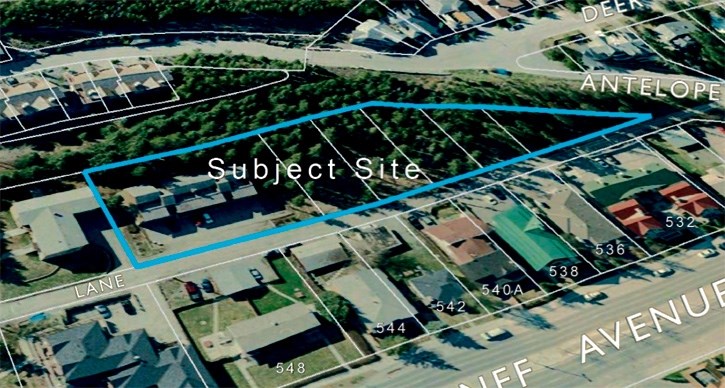Those with concerns about the proposed affordable rental housing development on Deer Lane being undertaken by the municipality were unable to speak to them publicly after appeals filed against its approval were withdrawn this week.
Three appeals were filed against the Municipal Planning Commission approval of the Deer Lane project Ti’nu by neighbouring and concerned residents and a hearing of the Development Appeal Board scheduled for Thursday (Feb. 23).
The appeal filed by Martin von Neudegg was withdrawn the week prior, but appeals by Ken Beatty and Andrew Hempstead (Appeal #07-16) and William Fisher and Eric Harvie (Appeal #09-16) were withdrawn the day before, according to appeal board secretary Randall McKay.
Board chair David Bayne noted to those in attendance that without an appeal to be heard, the board has no jurisdiction to hold a hearing or to accept public submissions on the project.
“Strictly speaking, from a jurisdictional point of view, since there is no appeal in front of us, there are no appellants here to speak and there is nothing specific we can listen to,” Bayne said. “We do not have the authority … we are not going to accept any speakers today because there is no appeal in front of us.”
Von Neudegg said he withdrew his appeal because he did not feel the process that it would go through would result in real solutions, or fix the concerns that he had.
“While everyone I know is fully in support of affordable housing, the assumptions upon which council is making its decisions are deeply flawed,” he said in an email statement. “But rather than work through a collaborative process, leading to a better project, council has chosen the adversarial appeals process as the outlet for public concerns.
“As we saw with Bylaw 380, this council is not interested in looking rigorously at complex problems and finding better solutions. Ideology trumps logic. Now, only time will tell if this project is truly one that is no cost to the taxpayers. Unfortunately (or fortunately depending upon one’s politics) by that time, the accountable parties will have moved on.”
Ti’nu is the name of the three-storey, 132-unit residence on Deer Lane, nestled between Marmot Street and Antelope Street, that was approved by the planning commission in November. The project was proposed by the Town of Banff to address a shortfall of available and affordable rental housing in the community. The project was the result of a competitive bid process and was proposed by Knightsbridge Homes and GEC Architecture.
The higher density development was a cause for concern with neighbouring residents, and the appeals filed expressed concern about the effect of the development on adjacent residents. That included increased traffic flow onto Deer Street and Deer Lane, parking overflow into adjacent neighbourhoods, pedestrian signage, building height and landscaping.
The project was designed to be non-taxpayer supported and affordable. The rental rates are expected to pay for the $22.8 million debenture needed to complete construction. Previously, Banff took out a $965,000 debenture to purchase the land from Parks Canada.
The appeal by Beatty and Hempstead focused on the variance granted for parking under policy C-122. They argued that a variance of parking stalls – from 144 required to 80 provided – did not meet the variance test under the Land Use Bylaw and Incorporation Agreement. It was an argument used successfully to appeal a development permit for an apartment project on Marten Street.
However, since the appeal was filed, council gave three readings to a bylaw to amend the Land Use Bylaw to include provisions in the policy specifically related to decreasing the amount of parking required for a rental apartment development.
Minimums were set for unit types and any reduction of parking was tied to a series of criteria, such as proximity to downtown, transit and bike racks.
Fisher and Harvie filed an appeal because of numerous concerns they had over landscaping of the site and surrounding area.
When the application for the development permit was approved by the Municipal Planning Commission in 2016, Fisher said the landscaping plan was not comprehensive enough to address significant issues on site, and in the adjacent areas. In particular, he said, a sloped area adjacent to the lots being used to develop the rental affordable housing project was not addressed to their satisfaction as adjacent neighbours.
But after submitting their appeal, Fisher said the Town of Banff worked to address the need for a comprehensive landscaping plan.
“We had raised all those concerns and the Town of Banff listened to those and I give them credit for taking our concerns seriously,” Fisher said. “They listened to our concerns and engaged a landscape architect to look at the tricky spots.”




